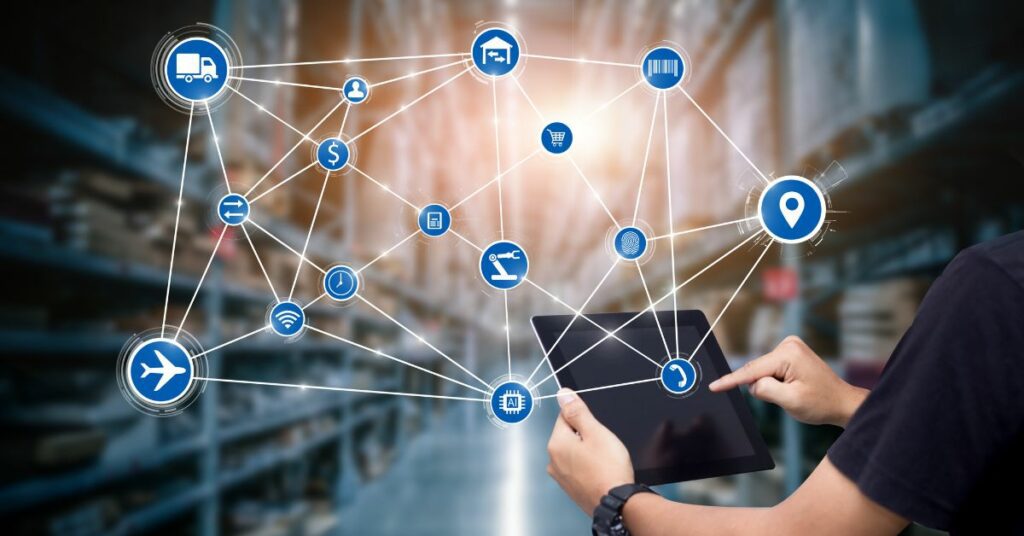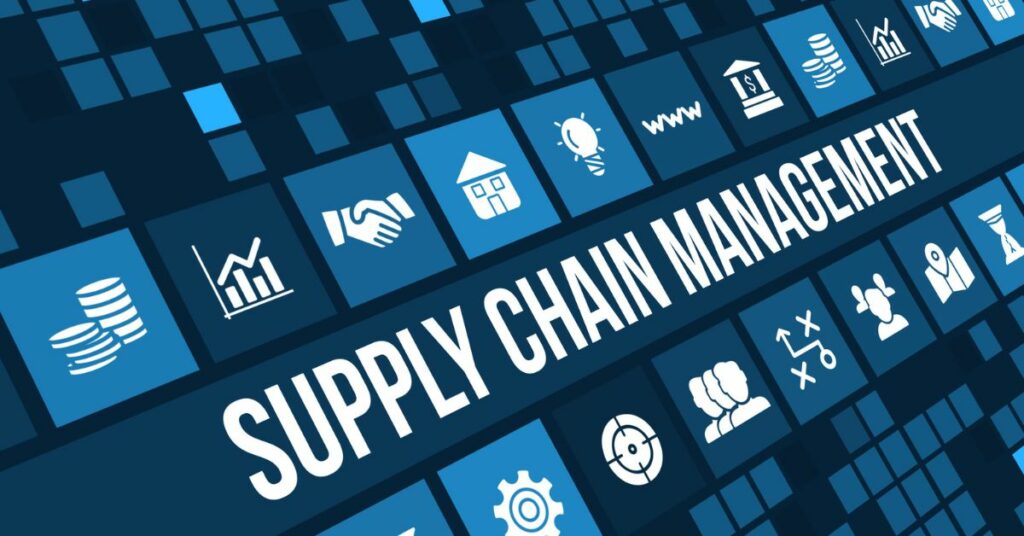With the advent of Artificial Intelligence (AI), the logistics industry is undergoing a significant transformation. AI-powered technologies are transforming the way logistics operations are managed, improving efficiency, accuracy, and overall customer satisfaction. In this blog, we will explore how AI is revolutionizing the logistics industry including the benefits it offers, the use cases, and how we can incorporate AI to strengthen your logistics management. Continue reading to know more.
AI in the Logistics Industry: Market Overview

AI has emerged as a game-changer in the logistics industry, transforming traditional practices and paving the way for advanced operational capabilities. According to recent market insights, the adoption of AI in logistics is rapidly increasing. AI adoption would facilitate numerous benefits to logistics companies. Businesses can streamline processes, improve efficiency, and make data-driven decisions.
Read Also: How CRM Integration to Logistics is Benefiting Logistics App Development?
Reasons to Incorporate AI in Logistics:
Incorporating AI in your supply chain & Logistics business can get you great benefits including-
Improved Efficiency: AI automates repetitive tasks, reducing manual effort and streamlining logistics operations, resulting in faster order processing, optimized inventory management, and reduced lead times.
Enhanced Accuracy: AI algorithms can process and analyze data with a high level of accuracy, minimizing errors and improving inventory forecasting, demand planning, and order fulfillment accuracy.
Real-time Visibility: AI-powered tracking and monitoring systems allow visibility into the movement of goods. This further allows better supply chain coordination, proactive issue resolution, and improved customer service.
Real-time Decision Making: Data derived from AI algorithms can help in weather forecasts. This enables logistics companies to make data-driven decisions like optimizing routing, resource allocation, and inventory management.
Fraud Detection and Prevention: AI-powered systems can detect anomalies and patterns in transaction data, helping to identify and prevent fraudulent activities in areas like billing, payment processing, and cargo tracking. This ensures the integrity and security of logistics operations.
Supply Chain Visibility: AI-based technologies analyze data from multiple sources. The data can be used to track and monitor the movement of goods, identify bottlenecks, and proactively address any issues in the supply chain.
Regulatory Compliance: AI can assist in adhering to the ever-changing regulations and compliance regulations. AI-powered systems can automate compliance checks, validate documentation, and flag any potential violations, reducing the risk of penalties and legal issues.
Customer Insights and Personalization: AI can analyze customer data and preferences to provide personalized recommendations and tailored logistics services. By understanding customer needs and behaviors, logistics companies can improve customer satisfaction, loyalty, and retention.
Benefits of AI in Logistics & Supply Chain

The following points highlight the wide-ranging benefits of incorporating AI into logistics operations:
Cost Reduction: AI-driven optimization algorithms can identify cost-saving opportunities, such as efficient route planning, load consolidation, and resource allocation, leading to reduced transportation costs and improved resource utilization.
Enhanced Customer Experience: AI-enabled chatbots and virtual assistants can handle customer queries, track shipments, and provide personalized recommendations, delivering a seamless and proactive customer experience.
Risk Mitigation: AI algorithms can analyze data to identify potential risks and mitigate them proactively, such as predicting equipment failures, optimizing warehouse security, and identifying fraudulent activities.
Error Reduction: AI-powered systems can reduce human errors and improve accuracy in various logistics processes including order processing, inventory management, and shipment tracking. This leads to fewer mistakes and improved customer satisfaction.
Resource Optimization: AI-driven algorithm helps in reducing cost & optimizing resources like vehicles, drivers, and warehouse space, based on real-time data and demand patterns.
Enhanced Predictive Analytics: AI can provide advanced predictive analytics capabilities, enabling logistics companies to forecast demand, anticipate customer needs, and make proactive decisions. This helps in better inventory management, reducing stockouts, and optimizing warehouse operations.
Continuous Process Improvement: AI-powered systems can continuously analyze and optimize logistics processes, identifying areas for improvement and suggesting optimization strategies. This leads to ongoing process enhancements, increased efficiency, and cost savings over time.
How is AI Revolutionizing the Logistics Industry: Topmost Use Cases

The following use cases demonstrate the diverse applications of AI in the logistics industry-
Demand Forecasting
AI algorithms can analyze historical sales data, market trends, and external factors to accurately forecast demand, enabling businesses to optimize inventory levels and avoid stockouts.
Route Optimization
AI-powered route planning algorithms consider various factors like traffic conditions, weather, and delivery constraints to determine the most efficient routes, minimizing fuel consumption and maximizing delivery efficiency.
Intelligent Fleet Management
AI-powered fleet management systems are intelligent as they can optimize routes, monitor vehicle performance, and predict when to go for vehicle maintenance. Wondering how? These systems use real-time data via GPS, traffic information, and vehicle sensors to enhance overall fleet management.
Automated Document Processing
Optical character recognition (OCR) AI technology can automate the processing of shipping documents, invoices, and bills of lading. This minimizes errors, reducing manual efforts and allowing faster and streamlined logistics operations.
Demand Sensing and Inventory Optimization
AI algorithms can analyze historical sales data, market trends, and external factors to predict demand patterns with greater accuracy. This enables logistics companies to optimize inventory levels, reduce stockouts, and minimize excess inventory, leading to improved working capital management and cost savings.
Warehouse Robotics and Automation
AI-powered robots & automated machines can handle repetitive tasks in warehouses, such as picking, sorting, and packing. This reduces labor costs in warehouse operations and enhances overall productivity.
Predictive Maintenance for Logistics Equipment
AI-based predictive maintenance systems can monitor the condition of logistics equipment, such as trucks, forklifts, and conveyor systems. AI analyzes sensor data from vehicles and equipment to predict maintenance needs, enabling proactive maintenance scheduling and minimizing downtime.
Risk Management and Fraud Detection
AI technologies can analyze data from multiple sources to identify potential risks, fraud patterns, and anomalies in logistics operations. This enables companies to implement proactive measures to mitigate risks, prevent fraud, and enhance the security of their supply chains.
Last-Mile Delivery Optimization
AI algorithms optimize last-mile delivery by considering factors like traffic patterns, delivery windows, and customer preferences, ensuring timely and efficient deliveries.
Supply Chain Optimization

AI-powered supply chain management systems optimize inventory levels, improve demand forecasting accuracy, and enable real-time supply chain visibility, leading to better decision-making and improved efficiency.
Risk Management
AI analyzes data to identify potential risks, such as delays, disruptions, or quality issues, enabling proactive risk mitigation and contingency planning.
Read Also: How Much Does A Logistics And Transportation App Development Cost?
Conclusion
There is no doubt that AI is transforming the logistics industry into a better one. Businesses are achieving unprecedented levels of efficiency, accuracy, and customer satisfaction using AI in their Logistics business. So, it’s high time to embrace AI-powered solutions to stay competitive, adapt to your logistics business & unlock new opportunities for growth and optimization.
How Can QSS Technosoft Help You Incorporate AI into Your Logistics Management?
QSS Technosoft Inc, a leading technology partner, specializes in AI-powered solutions for logistics management. Our expertise in developing custom AI solutions tailored to the logistics industry can help strengthen your logistics management. With our deep understanding of logistics processes and AI technologies, we can provide the following AI assistance:
- AI-driven Demand Forecasting: Our advanced AI algorithms can analyze historical data, market trends, and external factors to accurately forecast demand, enabling you to optimize inventory levels and improve supply chain planning.
- Route Optimization Solutions: We can develop AI-powered route optimization algorithms that consider various factors like traffic conditions, delivery constraints, and real-time data to determine the most efficient routes for your fleet, reducing transportation costs and improving delivery efficiency.
- Warehouse Automation Systems: Our AI-enabled warehouse automation systems leverage robotics, machine vision, and AI algorithms to automate picking, packing, and sorting processes, improving warehouse efficiency and reducing operational costs.
- Predictive Maintenance Solutions: By analyzing sensor data from your vehicles and equipment, our AI solutions can predict maintenance needs and schedule proactive maintenance, minimizing downtime and reducing maintenance costs.
- Supply Chain Analytics: We can develop AI-powered supply chain analytics solutions that provide real-time insights into your supply chain performance, enabling you to identify bottlenecks, optimize inventory levels, and make data-driven decisions to improve overall supply chain efficiency.
What else? We can tailor AI solutions to meet your specific business requirements.
So, what are you waiting for? Stay ahead of the competition & optimize your logistics processes with QSS Technosoft’s AI-powered solutions.
Contact us today to discuss how we can assist you in leveraging the power of AI for your logistics management needs.
We are proud to mention that our work has been recognized by leading B2B reviews and research platforms like GoodFirms, Clutch, MirrorView, and many more.


Transforming Logistics: How AI is Shaping the Future of the Industry?